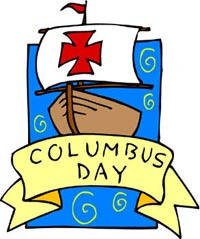In Fourteen Hundred and Ninety-Two, Columbus Sailed The Ocean Blue….
Medical Pharmaceutical Translations • Oct 14, 2013 12:00:00 AM

So goes the rhyme taught to countless American elementary school children in generations past, as they studied about Christopher Columbus. Every October, young children learn about this brave sea captain who defied the ideas of his time, and sailed west in search of the riches and commercial goods to be found in the mysterious and wonderful lands of the Far East. Why do we still talk about and celebrate this explorer over 500 years after his famous voyage? The answer may seem easy, but it can also be complicated.
Many visitors to the United States might get the impression that Columbus Day is just a day for big sales and promotions in the shopping malls. They might also be surprised to learn that many businesses, government offices, and schools are closed for this holiday. Both of these things are true, and Columbus Day has also become a day for Americans of Italian heritage to celebrate their ancestry. The real history behind the meaning of the day is often lost to many people—including a great many American citizens
Why do Americans celebrate this Italian sailor? The simple story taught to school children is that Columbus was born in Genoa, Italy in 1451, and when he became an accomplished sailor, he wanted to go on an expedition to find a quicker, easier route to India and China. People in Europe liked the products of those lands, but the journey to reach that part of the world was long and dangerous. Columbus had the radical idea that if he sailed directly west, he would reach India. He believed that the world was round, and that the distance to China and India was not so great. He asked for financial assistance from several countries until finally, King Ferdinand and Queen Isabella of Spain agreed to help him. He and his crew sailed from Spain in three small ships; the Niña, the Pinta, and the Santa María. They landed in the Caribbean Islands on October 12, 1492, and Columbus was convinced that he had reached the outer islands of India. Even after three more voyages, he never changed his mind about that. He is viewed as a brave hero who did a great thing. In particular, Italian Americans like to celebrate his contribution to history, since Columbus was Italian.
Why do some people with native ancestors in North and South America object to celebrating the accomplishment of Christopher Columbus? While the bravery of Columbus in sailing into unknown waters in search of a better trade route cannot be denied, modern historians take a different view of the event s surrounding Columbus and his adventures. Yes, he made a remarkable voyage, however, not everything he did was heroic and admirable. His treatment of the native people in the various islands he explored-San Salvador, Cuba, Puerto Rico, Jamaica, the Virgin Islands, Hispaniola (now Haiti & the Dominican Republic) and others-was unkind. He had many hundreds of them captured and sent to Spain as slaves. He was made the governor of this area, and was quite harsh with the people he governed. Many of the descendants of the native people Columbus mistreated feel it is wrong to celebrate him. They also look at his “discovery” of the lands in the western hemisphere as the beginning of the long, harsh exploitation of the land and all the native people in the Americas by the countries of Europe.
As the saying goes, “there are two sides to every story”. So, if you enjoy a day off on Columbus Day, and you find bargains in the store for the Columbus Day Sales, or if you see a Columbus Day Parade in New York City or another major city, you will be amongst the majority of people who enjoy and celebrate the day. History is seldom seen the same way by all people, and the stories told to us as school children did not necessarily give the whole picture.
Gail Patterson
#americanculture #ColumbusDay #culturecorner #usholidays #aiatranslations
